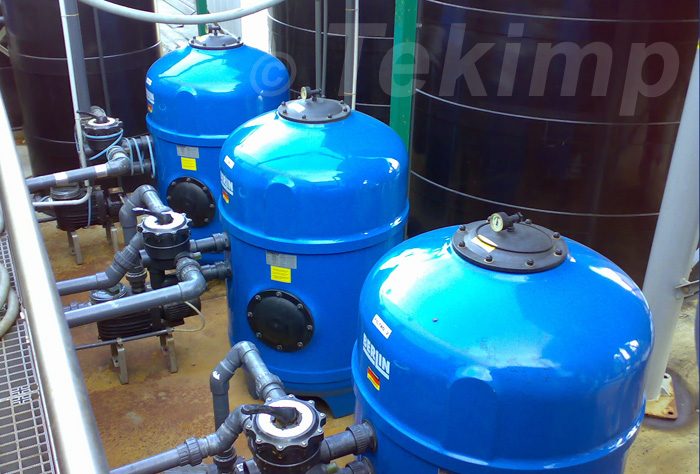PHYSICS AND CHEMICAL WATER PURIFICATION SYSTEMS
- FLOCCULATION
Flocculation is a treatment of waste water of chemical-physical type. It consists, in short, in the removal of suspended and sedimentable solids. In the surface treatment plants and in industrial coating, this technology is employed for the removal of sedimentable particles, inorganic compounds and heavy metals. - SAND FILTRATION
By the application of various filtering materials such as beds of quartzite, anthracite or active carbon, filter bags made of polyester or polyethylene allows the removal of suspended solids turbidity ‘of organic substances etc.
It is performed with single filters, battery ecct. with construction materials such as fiberglass, carbon steel AISI 304/316.
The filtration has generally low cost, reliable and removes up to 99.9% of outstanding. The filtration beds of sand does not require a prior coagulation / flocculation, and may not require a prior sedimentation. For against the surface of the filter requires a continuous maintenance. This process requires large surfaces, since it works with low flow rates. It should be remembered, finally, that the sand filtration is not suitable for water with high turbidity. - EVAPORATORS
The working principle of of the evaporators is based on the combined effect of the heat pump and the vacuum, fed with electrical energy, which allows to obtain the distillation of liquids at low temperature (about 35 °).
The heat pump, by means of a refrigeration circuit, provides the calories for evaporation and for the subsequent condensation of the distillate.
Appropriate circuits complete of valves and accessories, managed and controlled by PLC, send the liquid distilled, condensed and concentrated in specific separate tanks.
In most cases the costs for the management of an installation for physico-chemical treatment are significantly higher compared to a system of evaporation.
The use of evaporators has advantages in both economic and environmental terms:
Low power consumption for evaporation
Reduction of water consumption In addition, the distillate can be reused as process water with a quality very often similar to that of demineralised water. In this way you can save up to 98% water. This represents an important contribution to the preservation of primary resources.


